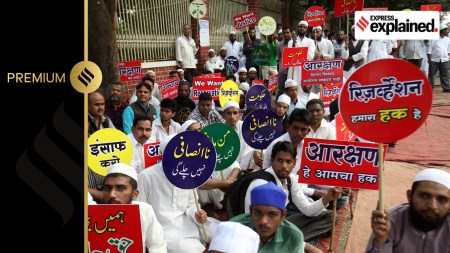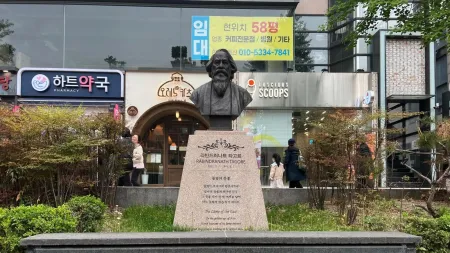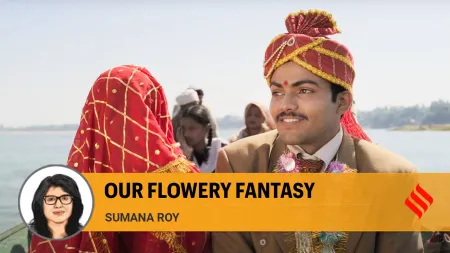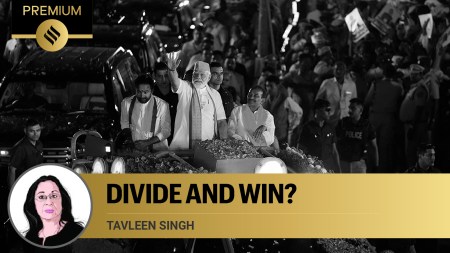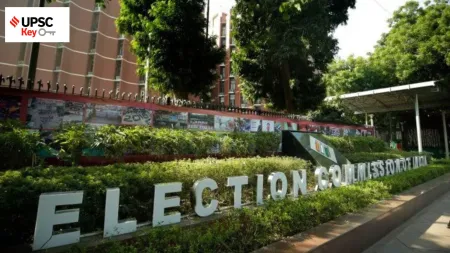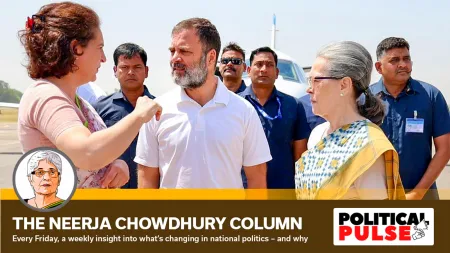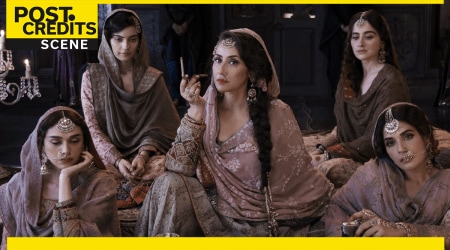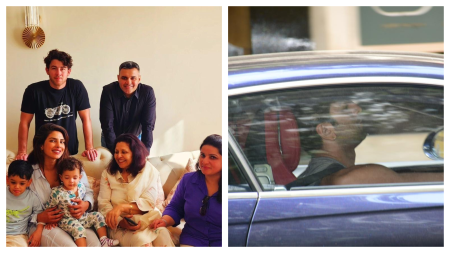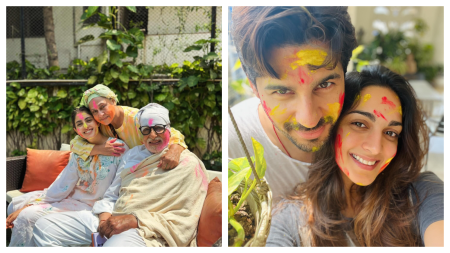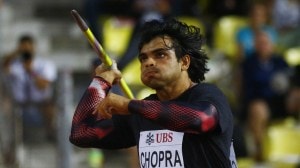- India
- International
Rituparno Ghosh: The lyricist beyond his cinema
Here is an attempt to understand the legacy of Rituparno Ghosh not only as a film-maker but also as a lyricist, whose understanding of the conjunction of the written and visual gave rise to stunning, often subversive, subtexts in his cinema.
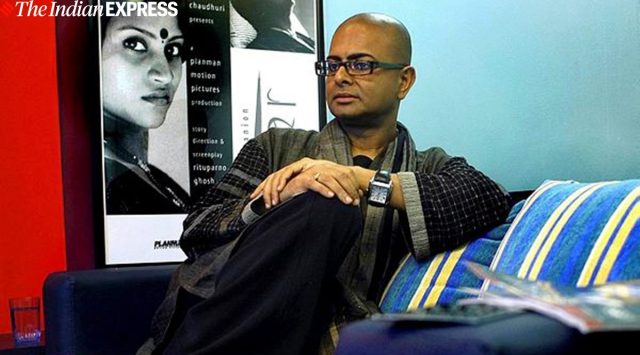 Rituparno Ghosh worked with several leading heroines of his times. (Photo: Express Archive)
Rituparno Ghosh worked with several leading heroines of his times. (Photo: Express Archive)In a post-Satyajit Ray era, when Bengali cinema was undergoing a massive cultural and economic crisis, Rituparno Ghosh – a man with an Economics degree and a background in advertising – entered the cinema-space with his internationally lauded chamber-drama Unishe April (19th April). The film, beyond its quiet meditation on the politics of a mother-daughter relationship over the span of a single day, was also reminiscent of a certain middle-class sensibility that was slowly fading from the cinema of the region. It brought the ordinary in fashion again. Throughout the film Debashree Roy (who went on to win a National Award for her performance in the film) was seen wearing a plain olive green t-shirt and a long skirt. One of the reigning heroines of the silver screen in those years, Ghosh deconstructed her star persona completely – presenting her as an ordinary middle-class, post-liberalisation student of medicine who is grappling with the grief of her deceased father and the overbearing absence of her dancer mother. For those who were still pondering upon the body of work this artist was going to produce, this was just the beginning of an almost three decade long obsession with star personae.
Ghosh eventually went on to work with several leading heroines of his times – deconstructing the brouhaha of their external silver screen personalities to present an image of sensitive and often raging femininity that was relatable at the least and stirringly poetic at the best. In his hands, Rituparna Sengupta became the survivor of a public molestation and marital rape. Aishwarya Rai, a woman who captured the imagination of a nation with her beauty, in a post-Devdas appearance finally felt humanely blood-veined in her portrayal of Binodini in Chokher Bali. But if people raised eyebrows at the decision of making Rai a pre-independence Tagore heroine, they were not ready for what he would do with the sexuality of Bipasha Basu in a role that dressed her in pleated jamdanis and mangalagiri – as she played the role of Radha, an amateur poet struggling the memory, art and ephemerality of her deceased poet husband.
Poets have always been a recurring motif in the works of Ghosh. Just like his cinema about cinema (Baariwali, Shubho Mahurat), Ghosh’s cinema has always featured characters reciting poetry to each other in moments of great duress and intimacy. In Dosar, the poem of a deceased beloved (written by Sujata Gangopadhyay) becomes a haunting spectral presence in the life of a woman coming to terms with her husband’s infidelity. In Titli, the two poets spaced across centuries – Kalidasa and Shakti Chattopadhyay – meet in the reunion of two estranged lovers, as they reminisce about their lost days of youth. In Chokher Bali, a woman comes to desire a man she has never seen through her chance encounter of a poem he has written for his illiterate wife – who will never read the poem addressed to her. These moments, often borrowed from the writings of other great poets, have always lent an abiding sense of lyricism to the works of Ghosh, an element that is seminal to his entire body of work.
Even in his most conversational mumblecore-esque films, there is an abiding attempt to locate lyricism in the most ordinary and mundane of situations and places – something that also reflects largely in the music Ghosh employed in his cinema. Although he rarely used music that was not penned by Tagore, Ghosh eventually went ahead to pen lyrics that were so subtextual to the narrative of his cinema, that many of these tracks – put to music by his long-time collaborator and music director Debojyoti Mishra – have become tokens of cultural currencies. But beyond the same, they also force viewers of his work to reckon his position not just as a mere maker of cinema but also a man who was constantly struggling to tap the poetic pulse in the ordinary existence of middle class bourgeois.
In Titli (The First Monsoon Day), Ghosh employed what will always go down as one of his best lyrics. Sample the lines – “Megh peoner bag er bhetor mon kharap er deesta/Mon kharap hole kuasha hoy/byakul hole Teesta”. The lines roughly translate to the following – “In the bag of the cloud-postman, there lies a pile of disappointments/The heart invariably fogs at the slightest of heartbreaks/Tell me, though why does it make you anxious such, the river Teesta”. These lines fill the screen right after an epilogue briefly summarises the content of Kalidasa’s Meghdootam, setting the tone for the film which too is about two estranged lovers and their chance encounter on the first day of the monsoon. The screen is filled with a montage of the Kurseong valleys and soon we see a young Titli, the eponymous protagonist opening a magazine she has received in the mail, and cut out a picture of Rohit – a Bollywood star she claims to be in love with. While the film eventually goes on to trace Titli’s relationship with her mother and her own coming of age, the idea of the mail remains a recurring motif. Even among the fog, Titli rushes to get a postcard for her star-love and there are repeated discussions on fan mails that have resulted in no replies.

Eventually, the film ends with another post delivery. This time the letter comes not for the daughter but for the mother and as the film ends with the mother reading a letter that bears the news of her erstwhile lover getting married, the song fills the screen once again. But this time Ghosh changes the refrain. As our eyes well up in tears for the mother and her daughter, Srikanto Acharya’s voice tells us – “Shei mon kharaper sroter taane/cholche boye Teesta”. The lines roughly translate to – “In the flow of the gushing broken heart/Forever shall flow the gushes of the Teesta”. The reprise of the song continues the image of heartbreak that inevitably comes with the image, but with that it also implants the idea of a sense of generational pain. The pain the mother suffered at the hands of Rohit, is nothing short of the heartbreak Titli undergoes – a pain that only solidifies her transition from young girl to a woman of the world.
Another recurring obsession of Ghosh was the figure of Krishna and Radha. A queer film-maker himself, Ghosh kept returning to the motif of the abandoned beloved even in his most heterosexual narrative structures. The idea of a scorned, abandoned lover – who can never be a wife – has as its essence a sense of abiding queerness that was a source of constant fascination for Ghosh. In many of his films, he brings in dialogue that repeatedly emphasises the pain of Radha – a pain he associates with the queer experience later on in films like Arekti Premer Golpo. There too the lyrics, despite a pitch of abiding melancholia, take a tone of stunning cosmic fatalism as the narratorial voice challenges God himself to be reborn as Radha in his next life. He argues, only then will the abject viraha and the tears of Radha ever make sense to him. His preoccupation with the Radha figure keeps recurring in his films visually, but it is turned into an obvious leitmotif in his first Hindi feature, Raincoat. The first song of the film Mathuranagarpati Kahe Tum Gokul Jao plays out to the image of Ajay Devgn’s character taking a train to Kolkata – where he is looking for a job. The trip, we know, will also lead him to visit his estranged lover who he abandoned years ago. As the film proceeds, the imagery grows only stronger and stronger. Ghosh who wrote the lyrics in Maithili, brings forth an unseen quiet rage in the verses of Piya Tora Kaisa Abhimaan. The spectacular song proceeds to an entreating climax where the futility of a sringara is explained.
Waiting, the film argues, is a labour that is often unacknowledged. An act of love, often dismissed in the externalities of superficial expressions. The final verse of the song, describes in detail the idea of this sringara with specific worded references to ‘abhushan’ and ‘kanchan’. One immediately realises that in the context of the film, perhaps such a sringar is not futile since Aishwarya Rai’s gift of literal gold ornaments will eventually ensure that Ajay Devgn’s company survives. But pay attention to the final line of this song that is essentially a male voice asking a female beloved the reason behind her hurt. Ghosh writes, “Khali chandhan laga ang mai ha/Chandan garal samaya”. Sringara, essentially done for the pleasure of the partner this time will temporarily tide over the needs of the lover, but will ensure yet another indefinite period of estrangement from the beloved. A waiting that is as good as death by poison.
The queerest transposition of this image, however, occurs in Sanjoy Nag’s Memories in March – a film Ghosh wrote and acted in. There too Ghosh, as the credits say ‘rhymes’. In a soundtrack filled with spectacular ballads, Ghosh outdoes himself in the song Bahu Manuratho. Written in Maithili, this song too is centred around the very idea of the lonely abhisarika in the full splendour of her sringara. The song begins with a wish assertion. The female voice, clearly a stand-in for Radha is found telling her sakhi that she is on a “Mohan-abhisar” and the “bahu manoratho” (infinite desires) of her heart will perhaps be finally satiated in this one journey. The song is masterfully filmed against a scene that details and recounts the aftermath of the accident that pivots the narrative of the film.
It too is about a journey late in the night. But this time an accident has taken place, and a forbidden lover comes to the untimely aid of his beloved. As the song proceeds, we see images of the ambulance, as a bloodied corpse is tended to. Immediately followed by images of it being pushed for operative procedures, followed by the lover waiting in the cold steely greys of the waiting room, awaiting news of the fate of the beloved and his accident. The song this time paints Radha as a figure of eternal pining calling her nothing more than a “chir-abhagini” or the eternal unfortunate. Indeed what is the fate of queer lovers in this country but little more than that?
The film not only outlines a forbidden love affair between an older and younger man but also an employee and his employer – a dynamic that further problematizes the relationship in a post-MeToo landscape. As the character of Rituparno proceeds to have a final breakdown in the hands of Raima Sen, the lines dole out the sentiment – “Sakhi hum kabahun na abhisari jau/Dukha laaj etat seh nahin paau”. The idea of such an accident threatens to bring to the fore an affair that can, and eventually does taint the image of the lover who survives the misfortune. Yet, the song, entrenched in ideas of queer politics brings up the idea of an ephemeral waiting that must continue even beyond the confines of death as Shubhamita’s voice claims – “Phir aaju mohan abhisari jaau/Sakhi bol etat dukh kaha paau”. Despite the shame, somehow the pain of the same unrequited journey, seems reward enough for a love that appears so overwhelming to bear.
In retrospectives of his quite vast body of work, there often seems to be missing an attempt to engage with Ghosh’s position as a lyricist. While the latter half of his career can be understood as an attempt to grapples with the ephemerality of life through his preoccupation with reality, memory and dreams, one cannot dismantle the abiding sensibility of Ghosh in using the lyrics of his songs to paint larger narratives and sub-texts for his films that are often reduced to mellow chamber dramas. An attempt to find lyricism in the mundane ordinary, finds expression in imbuing his own lyrics with the poetry of life, which though sourced from canons of the classical, if read through finds abiding echoes in modern culture all around and over us.
Photos
May 08: Latest News
- 01
- 02
- 03
- 04
- 05



